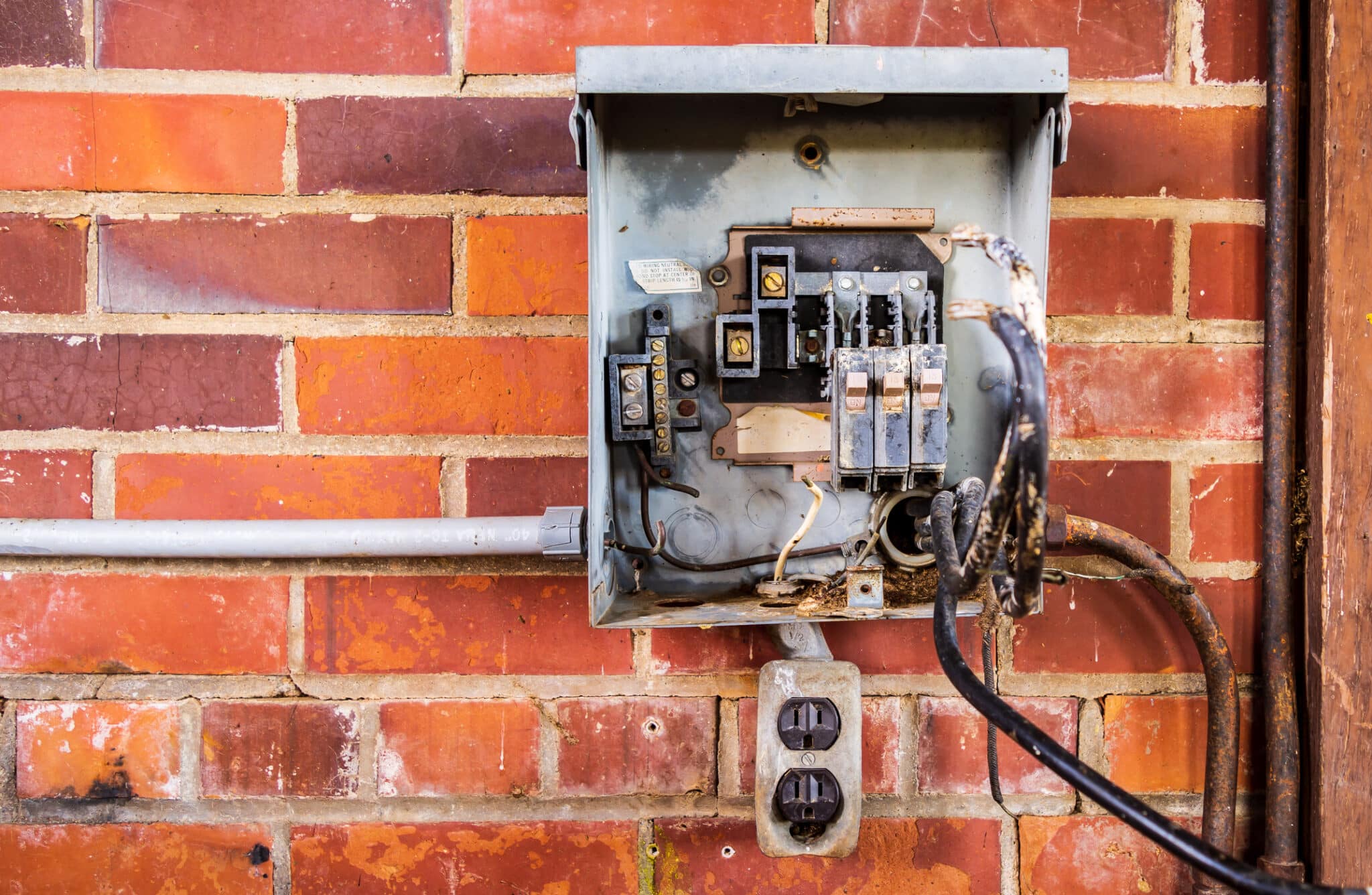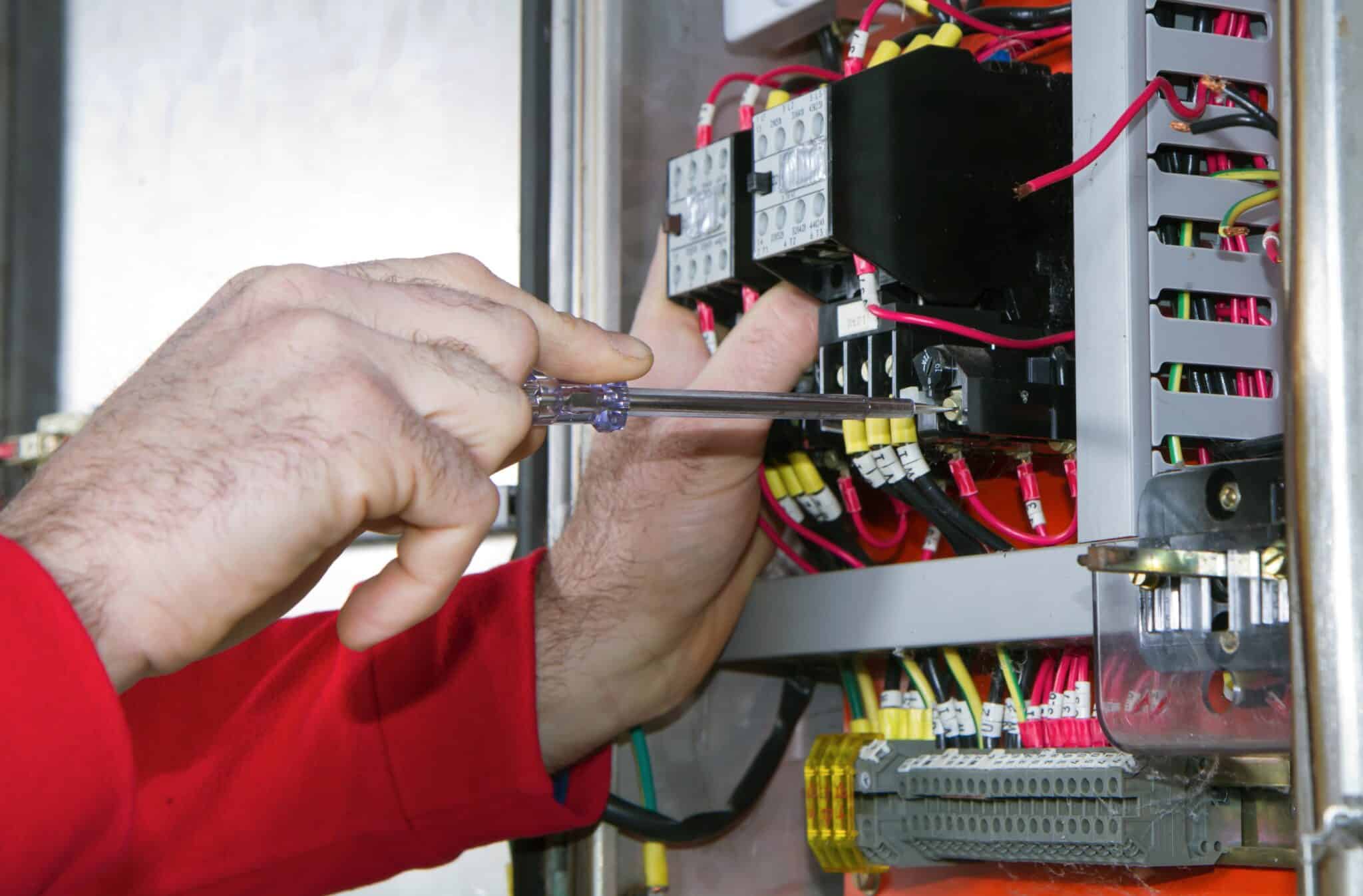Electrical Panel Upgrades – Experiencing frequent power outages or flickering lights at home? These could be signs that your electrical panel needs an upgrade. Keeping your electrical panel in top shape is essential for ensuring your home’s safety and efficiency.
In this blog, we’ll explore everything you need to know about electrical panel upgrades, from recognizing the signs to understanding the benefits and the process involved.
What is an Electrical Panel?
An electrical panel, often called a breaker box or fuse box, is the central hub for your home’s electrical system.
It’s the main distribution point where the electricity from the utility company enters your home and is divided into different circuits to power everything from your kitchen appliances to your bedroom lights.
Imagine it as the heart of your home’s electrical system, pumping electricity throughout your house just like your heart pumps blood through your body.
Inside the panel, you’ll find circuit breakers or fuses. These are safety devices designed to cut off the flow of electricity if a circuit gets overloaded, preventing potential fires and damage.
So, when you plug in too many gadgets and the power goes out in part of your house, it’s likely that a circuit breaker has tripped to protect you.

Signs You Need Electrical Panel Upgrade
Frequent Circuit Breaker Trips
Frequent circuit breaker trips are a clear sign that your electrical panel may be struggling to handle the electrical load in your home.
These trips mean that the panel is protecting you from potential overloads, but it’s also a hint that your system might be outdated and in need of an upgrade.
Consistently tripping breakers indicate that your panel cannot keep up with your home’s electrical demands. Upgrading can prevent future issues and ensure a more reliable power supply.
Flickering Lights
Flickering lights, especially when turning on a large appliance, can indicate that your electrical panel isn’t providing a consistent power supply.
This can be more than just an annoyance—it might signal serious electrical issues that need addressing.
Inconsistent power supply often points to an overloaded or faulty electrical panel. Upgrading your panel can resolve these issues and provide stable electricity throughout your home.
Outdated or Damaged Panels
If your home still uses an old fuse box or a visibly damaged panel, it’s definitely time for an upgrade.
Outdated panels can be unsafe and are often not equipped to handle the demands of modern appliances and electronics. Upgrading to a newer panel can prevent potential hazards and improve your home’s electrical efficiency.
Adding New Appliances
Planning to add new, energy-hungry appliances like an air conditioner, electric car charger, or hot tub means your existing electrical panel might not have the capacity to support these additions.
Upgrading your panel ensures you have enough power to safely and efficiently run all your new gadgets without overloading your system.
This proactive step helps maintain the safety and efficiency of your home’s electrical system, accommodating your modern needs.
Benefits of Upgrading Your Electrical Panel
Improved Safety
One of the most compelling reasons to consider electrical panel upgrades is to enhance the safety of your home. Modern panels are designed with advanced safety features that can prevent electrical fires and other hazards.
An upgraded panel ensures that your home’s wiring is up to code and capable of handling your electrical needs without risk.
This improvement can give you peace of mind, knowing your home is protected against potential electrical dangers.
Increased Electrical Capacity
Electrical panel upgrades boost your home’s electrical capacity, allowing you to run more appliances and electronics without tripping circuit breakers.
This is especially important for homes that use a lot of modern technology or have undergone renovations that added to the electrical load.
With a new panel, you can enjoy all your devices without worrying about overloads. This ensures a smoother and more efficient operation of all your electrical gadgets.
Enhanced Home Value
Investing in electrical panel upgrades can also increase your home’s value. Potential buyers look for homes with updated electrical systems because it signals that the property is safe and capable of handling their needs.
This can make your home more attractive on the market and potentially lead to a higher selling price. Upgrading your panel is a smart move for both your current comfort and future financial gain.
Energy Efficiency
New electrical panel upgrades can contribute to improved energy efficiency. Older panels may have worn-out components that lead to energy wastage.
Upgrading to a modern panel can help ensure that your home uses electricity more efficiently, which can reduce your energy bills over time. This eco-friendly choice is beneficial for both your wallet and the environment.
How to Determine if You Need an Upgrade
Professional Inspection
One of the most reliable ways to know if you need an electrical panel upgrade is to have a professional inspection.
Licensed electricians can evaluate your current panel and determine if it meets the demands of your household.
They can identify potential issues and recommend the best course of action. This ensures that your electrical system is safe and up to code.
DIY Checks
While professional inspections are ideal, there are some DIY checks you can do to see if electrical panel upgrades might be necessary. Look for signs such as frequent breaker trips, flickering lights, or an older panel that still uses fuses.
Also, if you’ve added new appliances or renovated your home, you might need an upgrade. These checks can give you an initial idea of whether your panel is keeping up with your needs.
The Electrical Panel Upgrades Process
Initial Assessment
The first step in the electrical panel upgrade process is an initial assessment. A licensed electrician will visit your home to evaluate your current panel and electrical system.
They will determine the capacity of your existing panel and identify any issues that need addressing. This assessment helps in planning the upgrade and ensuring it meets your home’s specific needs.
Choosing the Right Panel
After the initial assessment, the next step is choosing the right panel for your electrical panel upgrades. The electrician will recommend a panel that suits the electrical demands of your household.
Modern panels come with various features and capacities, so it’s essential to select one that can handle all your appliances and future needs. This step is crucial for ensuring long-term safety and efficiency.
Installation Steps
The installation of your electrical panel upgrades involves several careful steps to ensure safety and efficiency. Here’s what you can expect:
- Power Shut Off: First, the power will be turned off to ensure safety for both the electrician and your home.
- Removal of Old Panel: The old panel will be removed to make way for the new one.
- Installation of New Panel: The new panel will be installed in its place.
- Wiring Connection: The electrician will connect all the wiring to the new panel, ensuring each circuit is correctly configured.
This process is done meticulously to ensure that everything is up to code and functions correctly. By following these steps, your electrical panel upgrade will provide enhanced safety and reliability for your home.
Post-Installation Testing
Once the installation is complete, the final step in the electrical panel upgrade process is post-installation testing. This ensures that everything functions as it should and that your home is safe. Here’s what the process involves:
- Power Restoration: The electrician will turn the power back on to your home.
- Panel Testing: They will thoroughly test the new panel to ensure it’s working correctly.
- Circuit Checks: Each circuit will be checked to confirm there are no issues.
- Safety Confirmation: This step is vital to ensure your new panel operates safely and efficiently.
By completing these steps, you can be confident that your electrical system is ready to handle your home’s needs.

Understanding the Different Types of Electrical Panels
Main Breaker Panel
The main breaker panel is the most common type of electrical panel found in homes. It controls the electricity coming from the utility company and distributes it to the various circuits in your house.
This panel has a main breaker that can shut off power to the entire home, providing an essential safety feature. Upgrading to a new main breaker panel can improve your home’s overall electrical safety and capacity.
Fuse Box
Although less common today, some older homes still use fuse boxes. These panels use fuses instead of circuit breakers to protect against overloads. However, fuse boxes can be a fire hazard and are not suitable for modern electrical demands.
Upgrading from a fuse box to a breaker panel is a crucial step in electrical panel upgrades, enhancing both safety and efficiency.
SubPanels
Subpanels are secondary panels that branch off from the main panel. They are often used to distribute power to specific areas of the home, such as a garage or workshop.
Subpanels are convenient for managing additional electrical loads without overloading the main panel. If you’re expanding your home or adding new appliances, installing a sub-panel might be part of your electrical panel upgrades.
Transfer Switches
Transfer switches are essential for homes with backup generators. They safely switch the power source from the utility grid to the generator during an outage.
Having a transfer switch installed as part of your electrical panel upgrades ensures that your home remains powered during emergencies, without the risk of back-feeding electricity into the grid.
Choosing a Professional Electrician
What to Look For
When looking for a professional to handle your electrical panel upgrades, start by seeking someone with extensive experience and knowledge in electrical systems. Here are key points to consider:
- Experience and Knowledge: An experienced electrician will be familiar with the specific requirements and potential challenges of upgrading an electrical panel.
- Clear Communication: They should be able to explain the process clearly and provide a detailed plan for your upgrade.
- Track Record: Make sure they have a good track record of successful panel upgrades and positive customer feedback.
By carefully choosing a qualified and reputable electrician, you can ensure your electrical panel upgrade is performed to the highest standards, providing safety and efficiency for your home in Rockwall, TX, Royse City, TX, or Forney, TX.
Checking Credentials and Reviews
Before hiring an electrician for your electrical panel upgrades, check their credentials and reviews. Ensure they are licensed and insured, as this guarantees they have met the necessary training and safety standards.
Look for reviews and testimonials from previous clients to gauge their reliability and quality of work. Reputable electricians will have a strong online presence with positive feedback from satisfied customers.
DIY vs Professional Electrical Panel Upgrades
Risk of DIY
Attempting DIY electrical panel upgrades can be extremely risky. Electrical work is complex and dangerous if not handled correctly. Mistakes can lead to severe injuries, electrical fires, or extensive damage to your home’s electrical system.
Additionally, without proper knowledge, you might not adhere to local electrical codes leading to legal issues and safety hazards.
Therefore, while DIY projects can be tempting to save money, the risks far outweigh the benefits when it comes to electrical panel upgrades.
When to Call a Professional
For safe and effective electrical panel upgrades, it’s best to call a professional electrician. Professionals have the expertise and tools needed to handle the upgrade correctly and safely.
They will ensure that all work complies with local codes and standards, giving you peace of mind.
Moreover, professional electricians can identify potential issues that you might miss, ensuring a comprehensive upgrade that meets your home’s electrical needs.
Common Mistakes to Avoid
Skimping on Materials
One of the biggest mistakes homeowners make during electrical panel upgrades is trying to cut costs by using cheap materials. Using subpar components can lead to malfunctions and pose serious safety risks.
Always invest in high-quality materials and components to ensure your upgrade is durable and safe. Remember, your electrical system is not an area to compromise on quality.
Ignoring Warning Signs
Ignoring warning signs that indicate your electrical panel needs an upgrade can lead to severe problems and dangerous situations. Here are some critical signs to watch out for:
- Frequent Breaker Trips: If your circuit breakers trip often, it’s a sign that your panel might be overloaded or outdated.
- Flickering Lights: Lights that flicker, especially when using multiple appliances, can indicate an unstable electrical panel.
- Outdated Panels: Panels that are visibly old or use fuses instead of circuit breakers need immediate attention.
Ignoring these signs can lead to serious electrical issues and even potential hazards. Address these issues promptly by considering an upgrade when necessary to ensure your home’s safety and efficiency.
Improper Installation
Improper installation is a significant risk if the electrical panel upgrade is not done by a qualified professional. Incorrectly installed panels can cause electrical failures, fire hazards, and other safety issues.
Ensure that the installation is carried out by a licensed electrician who follows all local codes and standards. This guarantees that your panel will function correctly and safely.
Secure Your Home’s Electrical Future with Gardner Electrical
Is your home’s electrical system up to the task? Don’t wait for a problem to arise. Contact Gardner Electrical today at (469) 770-7171 for professional electrical panel upgrades in Rockwall, TX, Royse City, TX, and Forney, TX.
Our expert electricians ensure your home stays safe and efficient. Schedule your upgrade now and experience the difference with Gardner Electrical!
Frequently Asked Questions
How often should an electrical panel be upgraded?
Electrical panels typically need an upgrade every 25-40 years. However, if you experience frequent breaker trips, flickering lights, or have added new high-energy appliances, you might need an upgrade sooner. Regular inspections by a professional can help determine the right time for an upgrade.
What are the dangers of an outdated electrical panel?
Outdated electrical panels pose several risks, including fire hazards, electrical shocks, and power surges. They may not handle the electrical load of modern appliances, leading to frequent outages and potential damage to your home’s wiring. Upgrading ensures your home is safe and up to current standards.
Can I upgrade my electrical panel myself?
While it’s technically possible to upgrade your electrical panel yourself, it’s not recommended. Electrical work is complex and dangerous, and mistakes can lead to serious injuries or property damage. Hiring a licensed electrician ensures the job is done safely and correctly.
How long does the upgrade process take?
The electrical panel upgrade process typically takes a few hours to a full day, depending on the complexity of the job. This includes the initial assessment, removal of the old panel, installation of the new one, and post-installation testing. Your electrician can give you a more precise timeline based on your specific needs.
What should I do to prepare for an electrical panel upgrade?
Before the upgrade, clear the area around your electrical panel to give the electrician easy access. Inform your household about the power outage that will occur during the upgrade process. Additionally, discuss with your electrician any specific concerns or requirements you might have to ensure a smooth and efficient upgrade.
The post Understanding Electrical Panel Upgrades appeared first on Gardner Electrical.






